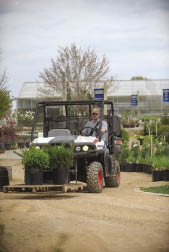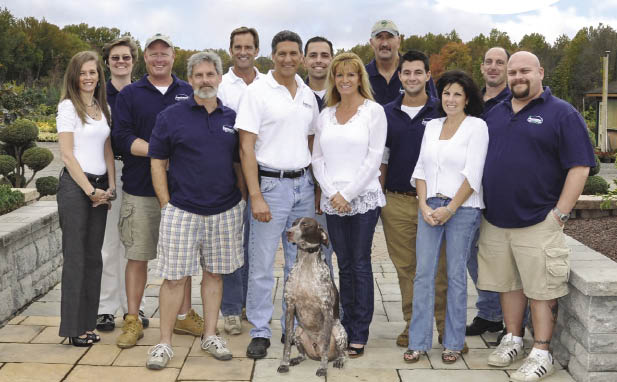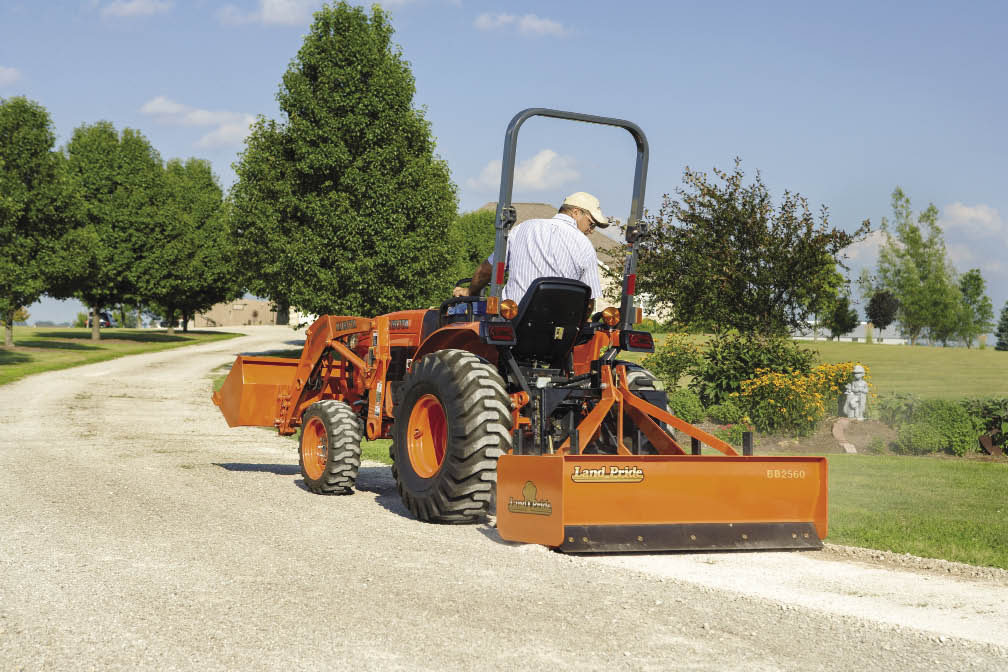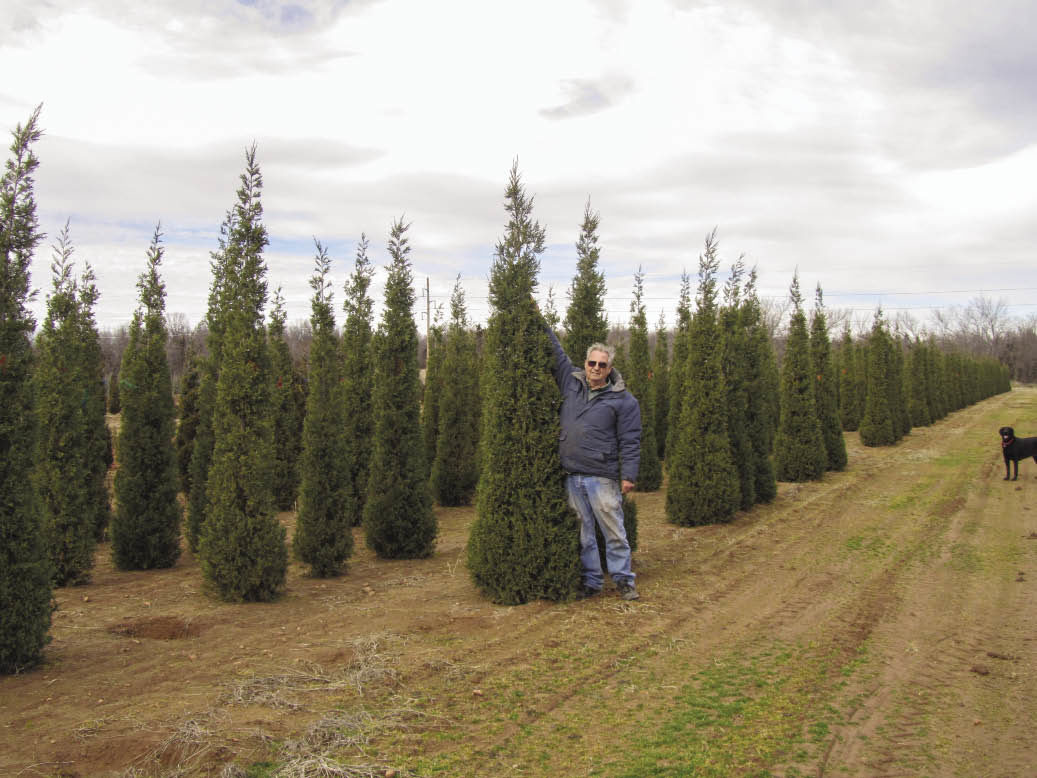Pictured Above: Jim Sanders, of Sanders Wholesale Nursery, Inola, Okla., chooses to work with a dealer who is close to his operation and can provide the service he needs to keep equipment in operation.
Sandwiched between the rural lifestyle market and the landscaping market is the nursery market. Nursery growers produce the shrubs, plants and trees rural lifestylers need to beautify their properties and landscapers need to complete residential and commercial projects.
When the housing market was in a downturn, this adjacent market suffered. However, dealers serving the nursery segment say they see signs of recovery. It’s time for dealers to take another look at adding to or expanding on outreach to nursery owners.
Market Outlook
“Nursery owners were hard hit with the recession, just like everybody else. They were really struggling to keep costs under control,” says Don Richards, owner of Applied Horticulture Consulting, Lake Oswego, Ore.
“There has been shrinkage, just like in every other market. There has been consolidation by choice or financial distress,” Richards says.
Chris Curry, wholegoods manager for OVS, a nursery and vineyard equipment and supply company with three locations in Oregon, says his market was hit hard by the recession.
“Before 2008, the nursery market in our area was one of the largest in the U.S. It’s not that way anymore. The northwest was the last into the recession and seems to be the last one coming out,” Curry says. He says the market has been improving over the last six months.

A variety of equipment including compact tractors, skid steers and utility vehicles help nursery operators transport and load stock.
“They used to want the newest and greatest equipment, but we haven’t seen that in the last few years,” says Curry. “Now, nurseries are starting to replace some older equipment. Hopefully, that’s a sign that things are changing for them.”
Rick Pantano, owner of Pantano Power Equipment, Manalapan Township, N.J., says his nursery market was also affected by the recession, but he also sees improvement.
“There has been a big reduction in construction of new homes, but people are reinvesting in existing homes by adding landscaping,” Pantano says.
Varied Equipment Needs
Richards says a lot of work done at nurseries, especially container nurseries, is done by hand. “But nurseries are like any other farming business. They need medium-sized tractors all the way up to the really big equipment,” he says.
Curry says nursery owners are looking for durability and simplicity in equipment. He sells Kubota compact wheel loaders and compact tractors for moving products and supplies within the nursery and for towing nursery carts. The compact size fits better between nursery rows. Kubota utility vehicles are also used to transport supplies and people and pull carts. Nursery owners generally chose diesel models because it’s easier to have diesel on site as opposed to the more heavily regulated gasoline, Curry says.
For working and maintaining fields, OVS supplies Gearmore and Spotlyte pull-behind sprayers as well as tillers, blades and soil conditioners from Land Pride.

Nick Morris is sales representative for White Star Machinery of Tulsa, Okla., a Bobcat dealership. His dealership promotes pre-season service equipment checks and sends a service truck to larger nurseries.
“One of the big ‘pluses’ in selling Land Pride is its partnership with Kubota. The attachments have been engineered to fit the tractors,” Curry says. Also, Land Pride attachments can be wrapped into the financing for new Kubota tractors.
Sanders Nursery Needs Equipment That’s Ready to Work
Jim Sanders, 68, says he’s been working in dirt most of his life.
“When I turned 18, I went to California because I wasn’t going to work in dirt like my dad. Then, I figured out working in dirt wasn’t so bad,” he says.
His dad, Sam Sanders, founded a nursery in the late 1940s. Today, the nursery is two operations. Sanders owns Sanders Wholesale Nursery, Inola, Okla., a wholesale tree operation. A separate operation is Sanders Nursery & Distribution Center, which is owned by the Berry Family of Nurseries and is one of Oklahoma’s largest nurseries. It has locations in Broken Arrow and Inola, Okla. It sells plants, shrubs and trees to consumers and wholesalers.
Sanders says the equipment he works with on the tree side of the operation includes six Bobcat skid steers and several compact tractors, including a Massey Ferguson 240 and Kioti DK55. Attachments include rotary cutters for mowing between the tree rows; discs and rototillers for working the ground; and pallet forks and nursery jaws for transporting stock.
Sanders works with White Star Machinery out of its Tulsa, Okla., location. The dealership is close, which is important when he needs service or new equipment. He works with Nick Morris from the sales team.
“Nick comes out and calls to see if I need anything. For me, it’s basically how fast can I get a machine in for service and back out. Our Bobcats might sit for five months out of the year. When we do go, we need them all running,” he says.
Craig Hines, president of Hines Equipment, a Kubota and New Holland dealership in Rocky Mount, N.C., says the nurseries in his area mainly grow container plants. Pulling carts is the main task for the compact tractors he sells and nursery owners also purchase loaders with oversize buckets for moving and mixing soils.
“They’re not looking for anything special. They want something that’s easy to drive and maintain,” Hines says.
Rob Pauley, vice president and co-owner of Pauley Equipment, a Kubota dealership with three locations in California, says his nursery customers have similar needs, mainly towing carts.
“They purchase ‘bare-bones’ tractors. They don’t want the bells and whistles or creature comforts because the purchaser is not the one driving the tractor,” says Pauley. “They want durability because they really rack up a lot of hours.”
The tree nurseries in White Star Machinery’s region use a variety of equipment and implements. White Star is a Bobcat dealership with five locations in Kansas and Oklahoma. Nick Morris, White Star salesperson, sells compact track loaders and attachments, such as pallet forks, tree spades and nursery jaws. The equipment and attachments help operators dig out and load trees.
He says the track loaders help nurseries move between rows and operate even in muddy conditions and have the power to pull 40-foot trailers loaded with trees.
Everglades Farm Equipment, a John Deere dealership with 12 locations in Florida, serves a large nursery market, both tree and potted plant operations. Rick Puig, sales representative, says his nurseries use compact and subcompact tractor for jobs similar to nurseries around the country. The attachments he sells include post hole diggers, Frontier tilling equipment and WorkSaver tree booms. Gator utility vehicles also fill in for pulling carts and transporting people and supplies.
“They’re keeping skid steers for 4-5 years and keeping tractors longer, maybe 10-12 years,” Puig says. “They keep their attachments when they buy new tractors.”
Pantano of Pantano Power Equipment sells a variety of power tools to the nurseries in his area. Trimmers with extended poles trim growing trees and lighter-duty trimmers maintain hedges. Chain saws cut up trees that didn’t sell and need to be removed from the lot.
Pantano also sells mowers for maintaining areas between rows, generally models in the 60-72 inch cut range. He says Husqvarna zero-turn mowers are popular and this is his first year selling the Walker line of mowers. He’s even seen some interest in the Husqvarna propane mower.

Rick Pantano (center), shown here with his team from Pantano Power Equipment, Manalapan Township, N.J., supplies nursery owners in his market with Husqvarna power tools, including chain saws and trimmers.
Pantano pushes the advantage of a single line for power tools. “Nurseries are proud of their equipment and like keeping things uniform. Service is also very important. They don’t like downtime. By dealing with one brand, they can stock up on parts,” Pantano says.
Jason Johnson, territory manager for Washington Tractor, a John Deere dealership with nine locations in Washington state, sells compact tractors and skid steers as well as grounds maintenance equipment. His dealership carries Billy Goat’s line of mowing and debris equipment.
Promote Service — Reduce Downtime
Broken down equipment delays schedules and adds costs, so outstanding service is another way dealerships can best serve the nursery market. However, dealers indicate that the level of service requirements can vary.
Dealer Takeaways
- Nursery owners use a wide variety of equipment. Visit local nurseries personally to understand an operation’s total needs.
- Minimal downtime is important for nurseries, especially during the busy season. Offer the kind of service arrangement that meets their specific needs.
- Simple, durable equipment is preferred by many nursery owners. Be sure to have equipment on the lot to capture short-notice sales.
Pantano Power Equipment has four service technicians and one is designated for priority work, such as nurseries and landscapers.
“When they need a machine, they need it now. Waiting a week or 10 days is unacceptable,” Pantano says. Many times, the technician works on the machine while the customer waits. Despite operators’ need for maximum uptime, Pantano says he doesn’t sell many service packages.
“They’re more interested in warranties. They’ll get the best warranties even if it costs more. Margins are down and people are more concerned about how long before the equipment starts costing them money. That’s why companies that are extending warranties are winning them over,” he says.
Morris of White Star Machinery agrees, saying nurseries are holding on to equipment longer before trading in for new. He works with nurseries to set up pre-season checks and sends out service trucks to larger nurseries.
“You have to make sure they are running smoothly. Make sure their maintenance is getting done. If a machine breaks down, you think the world is going to end. But, in their case it just about does,” says Morris.
Puig of Everglades Farm Equipment says the nurseries in his area tend to do a lot of service themselves, but that doesn’t keep the dealership from trying to win service business. “We try to offer discounted service because we know how tough it can be,” he says.
Uncover Equipment Needs
Johnson of Washington Tractor says nursery owners may be looking for basic tractors, but there are still possibilities for add-on sales — if you understand how they will use the machine.
“Go in and really find out what they need, what makes them money and what makes sense. You can be an ally and strengthen their business,” he says.
Pantano says visiting nurseries is an important sales strategy for his business. “They are ‘show-me’ kinds of people. They want to know ‘Are you going to be there to service me and how fast can I get my equipment back?’” Pantano says.
Puig says their direct sales team visits nurseries and finds other ways to connect, such as by joining the state nursery association.
OVS has an agronomist on staff to supplement equipment and supply sales.
“We consider ourselves professionals serving professionals,” Curry of OVS says. The dealership used to have outside salespeople for the nursery market, but now agronomists fill the role of checking in to see what the dealership can do for them.
“With the agronomist speaking to them on a regular basis, they can forward those leads on to the salesperson,” Curry says.
Pauley Equipment pushes the strength of the dealership. “Our biggest advantage is our broad spectrum of services and versatility,” Pauley says, including their rental program. He says rental is targeted to the construction market, but nurseries sometimes use that equipment for expansions.
Value of Horticultural Crops to Increase
The United States Department of Agriculture predicts that the production value of U.S. horticultural crops will increase by more than 3% annually over the next decade and consumption of horticultural products will continue to rise.
The top five green industry production states by total industry sales are California, Florida, Oregon, Pennsylvania and Texas.
Once you identify their needs, dealers say you need to have equipment in inventory to make the sale. “You need to have equipment on hand. They don’t want to wait. They need to have products readily available for delivery,” Pauley says. “When they finally make the decision to buy, they want delivery this week.”
As with any sales opportunity, price is always a factor. However, he says his nurseries usually buy multiple units, so he’s able to provide discounts. “That’s typical with any high quantity sales. Of course we’ll give them a good price, even if this time they are only looking at buying one unit,” Pauley says.
Watch for Partnership Opportunities
Richards of Applied Horticultural Consulting says manufacturer leasing programs may be good options for those nurseries that don’t have maintenance expertise on staff.
“It’s easier for them to get major service work done through the dealership and the dealership can make money on the service. Dealers are making the same amount of money and acquiring a guaranteed sale of replacement equipment, plus the sale of the used equipment,” Richards says.

Compact tractor and skid steer attachments, such as this Land Pride box scraper, help nursery owners maintain growing areas and retail spaces.
Washington Tractor does do some business through its lease program to meet the seasonal demands for nurseries in late winter and early spring. For instance, they might lease an extra tractor to help move inventory.
Puig of Everglades Farm Equipment takes advantage of another offering from his manufacturer, John Deere Landscapes. John Deere Landscapes is a wholesale landscape supply distributor and corporate program of John Deere. Dealers can partner with the program to offer customers supplies, such as seed, fertilizer and chemicals.
He says the landscape products he sells at the dealership are mostly for residential customers. However, when a nursery buys equipment from him, they can earn points to purchase other products directly through John Deere Landscapes.
Johnson says the sales team at Washington Tractor accompanies a John Deere Landscapes’ representative on sales calls where the duo can promote a full solution, from supplies to equipment.
Johnson has found a new way to promote two of his other lines, Billy Goat and Scag. He worked with the manufacturers to set up a special discount rate for members of the Washington State Nursery & Landscape Assn. He says it promotes his dealership’s products and helps bring more value to its members.
“It’s all about making the industry better,” he says.






Post a comment
Report Abusive Comment